I’m nipping in between consultations. Except these are a bit more than consultations. This morning Mike has already had hour-long sessions with two of his new customers and after me, and presumably a bite of a sandwich, he is seeing two more.
He tells me these particular clients – because of depression, ill health, drugs or alcohol misuse – had been ‘parked‘ on Incapacity Benefit for some time, drawing benefit but not expected to find work.
Since the welfare reforms these men, and they are mainly men, find themselves having to get to grips with the flawed Universal Jobmatch online employment site and the increasingly rigorous demands of the Job Centre.
I like that the UCAN can be super-responsive. As a new need arises it adapts what if offers or adds something new into the mix. Which is why Vanessa has commissioned Mike, the CV-writing guru and career coach from Tuesday’s job club, to work closely with a number of hand-picked, long-term unemployed residents.
“There’s a part of Breightmet that is ranked pretty highly among the indices of most deprived areas in the UK,” says Mike. “Bolton at Home has researched the figures and there’s a particularly high incidence of people who are on, or had been on, Incapacity Benefit.”
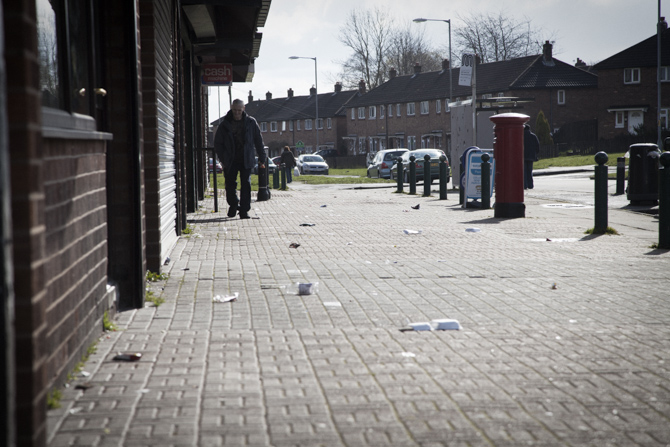
“So what sort of people are we talking about? Can you describe them?”
“One of the guys has been without regular work for more than 20 years, others for over 10,” says Mike.
“The younger ones obviously less so but with all of them substance misuse is a common theme. Interestingly, There is also an almost universal lack of confidence around literacy, particularly spelling. They can read well enough but writing is an issue.”
“But isn’t the JobCentre helping this group?” I ask. “As you say, they have been economically inactive for so long, surely they can’t be expected to job search without any support?”
“If I was in the JobCentre’s shoes, I’d argue they are being offered a lot,” says Mike. “But it’s inevitably very prescriptive given the volumes of candidates they are dealing with. One guy has been put on the Work Programme for new claimants and another has been sent along to Bury College to have his basic skills assessed… but now he has to wait two or three months before there’s a literacy course available. So there is support, but it tends to be less tailored. Does that make any sense?
“Yes. Yes, it does. But what are you doing differently?”
“I’ve come in with an open mind. We want to make sure their interaction with the JobCentre and with Universal Jobmatch is as positive as it can be. But what is fascinating and unexpected is how much the guys are opening up to me about themselves and about what’s stopping their progress. And there have been things I can do to help.”
“Like?”
“For instance, one guy at the end of our first session told me he was really self-conscious of his teeth. He hadn’t had dental treatment for 10 years and had very bad teeth, so bad they were affecting his self-confidence.
“So I organised a local NHS dentist to see him, even paid for a taxi to get him to one of the appointments and next week he’s being fitted with a new set of false teeth. He’s delighted, he can’t wait.”
“That’s brilliant. I like that.”
“Another guy is nervous of speaking on the phone and so doesn’t have a mobile. Of course, if you’re searching for work, coming across well in a phone call can be important. So I got him a cheap mobile from Asda and some credit and suggested he used it to order takeaway food, for instance. I call him from time to time and he’s even spoken on the phone to Vanessa now. It’s a little step which has improved his ability to function.”
“It comes down to seeing people as individuals, doesn’t it?” I say
“These are little gestures but quick wins, small victories that are showing them we can make progress. What’s fascinating is how freshly motivated a couple of them are at least, to get a job. I’m not going to put myself out here as the ‘fairy jobfather’ but I do think, in the right circumstances, two of them could be employed in the near future by someone and do well.”
“And the others?”
“Motivationally, they’re not quite ready yet.”
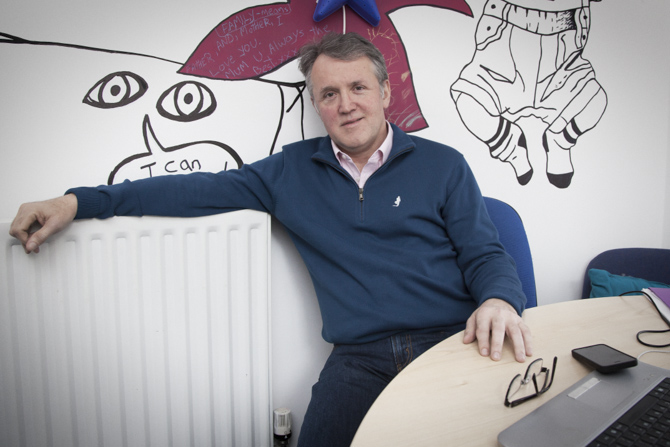
This is week four in a six-week project. After his ‘quick wins’ Mike has started working on what he calls ‘reframing’ the life story. “To begin with they’d all talk very negatively about themselves: drug and alcohol problems, being out of work, being homeless maybe. But now we are moving towards a more positive life story.
“We’re beginning to find the positive elements about them and getting them to express them more openly: are they a family man? Do they like working with other people? Maybe they enjoy the outdoors… anything really to get them thinking differently, and expressing their life stories more positively.
“The aim is to them more attractive to employers. None of it is untruthful, just a skewing of their story in their favour really.”
What Mike is doing over six hours isn’t rocket science. He’s building self-esteem, giving people time, allowing them to discover what they’ve got to offer. It’s personal and it’s making an impact.
As a little pilot study there are some important lessons to be learnt… and not just by the UCAN.
“I enjoy the little differences I am seeing already,” he says as I get ready to take his portrait. “And I hope they are too. It’s very satisfying.”
In his tiny kitchen Lee is putting away the contents of two plastic bags. This is all he will eat for the next week, until he can make another visit to the food bank.
It’s mostly tins: oxtail soup, kidney beans, sweetcorn, ravioli, baked beans, tuna. There’s a couple of packets of biscuits and some out-of-date trifle sponge fingers; a box of chocolate-flavoured breakfast cereal, a litre of orange juice and a packet of pasta.
Fresh items are limited to whatever has been donated to the food bank that week so Lee unpacks of a packet of trimmed runner beans, three sunflower-seeded wholemeal rolls, and a red and a green chilli.
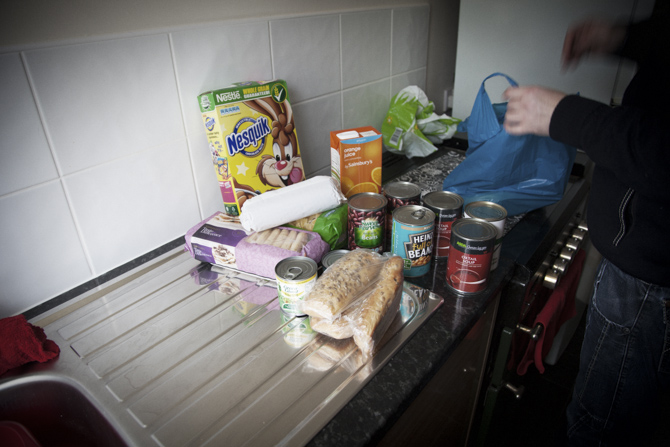
“Surely that won’t be enough,” I say, trying to imagine how these foodstuffs might be combined to make at least one meal a day for the next week. “Will you go hungry before next Monday?”
Lee nods.
“And what about the cereal? Have you got any milk to go with it?”
Lee opens his fridge, pulling out a half empty litre carton. “Sometimes you get long life milk but I’ve got this.”
“And what happens when that’s finished?” I ask.
He digs deep into one of his jeans pockets. “I’ve got £1.50 to buy some more,” he says. “And that’s it.”
Lee and I met for the first time just two hours ago. Monday is food parcel voucher morning at the UCAN and I was vaguely hoping I might find someone who I could accompany to pick up their supplies.
The UCAN staff all know Lee. They have supported him for some months now, most recently Rosanne has helped him apply for a citizen card – which the UCAN has paid for – so he’ll have the photo ID he needs for agency work. And for the past three weeks, they’ve given him vouchers for the food bank in town.
Up until November last year Lee had been working nights as an order picker at a fruit and veg warehouse. He enjoyed the work. One night he was ill, couldn’t get himself out of bed, and didn’t show up for work.
The next night he was still unwell and telephoned his boss. Apparently he’d already been replaced and his boss reported back to the Jobcentre that he had quit. In turn, the Jobcentre registered Lee as ‘voluntarily unemployed’ and has suspended his benefits for six months.
“It’s been getting me down, really down,” he says as Vanessa and I explain the idea behind the As Rare as Rubies blog, “I’ve been to the GP.”
“Come in tomorrow morning,” says Vanessa, knowing that today’s first concern is the food bank that opens just once a week. “We’ll make a list of priorities. It’s employment day and we can ask Cath to sit down with you. You’ve already spoken to Citizens Advice haven’t you?”
Pretty much every service the UCAN has to offer is relevant to Lee just now – employment advice, confidence-boosting, debt management, mental health support – and Vanessa is determined, as she now tells him, to get a team of professionals around him. But first, the food bank.
…. continued in The most generous
I walk through a bunch of teenage boys – and a cloud of marijuana smoke – to get to the front door this morning. Judging by the looks I get from those sitting at the nearest computers, some of the smoke follows me inside.
It’s only 9.30 and, as ever, the front room is already busy. Five of the eight computers are in use and I see job applications, emails and some online learning on the screens as I make my way to the back offices.
The UCAN isn’t open to the public every day but on these open access mornings Rosanne and Carl deal with a torrent of enquiries that sees them flitting from customer to customer, trying to keep all the plates spinning.
This morning I’ve decided to shadow Rosanne for as long as I can keep up, to get an idea of her role as a UCAN project officer.
By the time I have my notebook in hand she is already helping a young woman at one of the computers.
“How do I send this now?” asks the young woman. Rosanne points at the screen and reminds her how to send the email, an application for a job. “Brilliant. Thank you.”
Another woman is standing in the middle of the room, waiting her turn. “Do you know what I do with this?” she asks, holding out some papers.
Rosanne scans the form and passes it back, “Next, you need to list everyone who is moving with you. Then please let me see it again before you send it. Do you need an envelope?”
Back in the small office from which Rosanne keeps on eye on comings and goings there is a small huddle of colleagues. Vanessa is leading a discussion about the homeless alcoholic man who is frequently outside their parade of shops. Minutes later the huddle breaks and Rosanne is out into the front room again.
“Hiya, are you all right?” she says to a man who has just side stepped the ‘cannabis crew’.
“Can I use the phone please?” he asks. “Do you have the number for Jobseeker’s?”
As Rosanne’s pointing out the numbers pinned up above the customer phone, another man is signing in, the front door barely having had time to close. This customer wants to use a computer.
“You might be better off with this one,” she says, directing him to one of the computers which is less temperamental. These machines get a lot of use and some are more reliable than others.
It’s not always clear to me which customers are new to the UCAN as Rosanne treats everyone as if she has known them for years. But within minutes – and after she has exchanged pouches with a colleague delivering the internal mail – she is telling this new arrival about the Tuesday job club which suggests he’s not a regular. “And then there’s the Clear Aims course which is brilliant,” she says. “Cath here can tell you more about that, if you’re interested.”
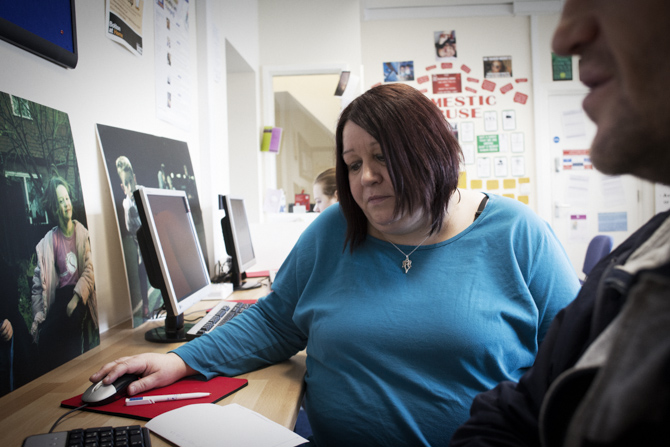
Next Rosanne is answering the telephone. “Half past 12,” she says to the caller. “Then work club from 1.30 til 4.00. Okay, see you then.”
She comes off the phone, beaming. “Why so happy?” I ask.
“That woman on the phone was referred by the Jobcentre. She was told to ask for Rosanne because ‘she’s fantastic’!”
A young mum has just appeared at the office door, gently pushing her daughter in front of her. “She’s starting nursery this afternoon, at the big school,” she declares. “Show Rosanne your uniform, Kelly.”
Kelly proudly peels back her coat to reveal a brand new blue sweatshirt. Rosanne makes a fuss over the little girl and she and her mother leave happy, only to be replaced by a middle-aged woman who looks as if she hasn’t slept in days.
“I’m being made redundant, Rosanne,” says the newcomer, barely able to contain her tears.
“Come and sit down,” says Rosanne, offering the only other chair in the room.
“Can I make you both a brew?” I ask as the office door is closed behind them. I’ve managed about 15 minutes.
This was the morning after the first episode of Benefits Street, the now controversial Channel Four documentary following benefit claimants on a single Birmingham street.
“Not one of them, I believe, want to get a job,” says Darren as we sit in the upstairs office. “It was just drink and drugs… skipping through life… it’s not typical of what it’s like on benefits. It’s probably one of the worst streets in Birmingham, but that’s not the point, no matter where you live you can try and find a job.
“No one on that programme were determined enough. They were getting out of bed and it was fag in mouth and can in hand. You just can’t do that.”
Darren is 37 but looks 25. Four years ago he had an operation on his feet and spent the next 18 months in a wheelchair. This month he’s just received the first pay packet he’s had for two years. He’s a UCAN success story and he doesn’t mind who knows.
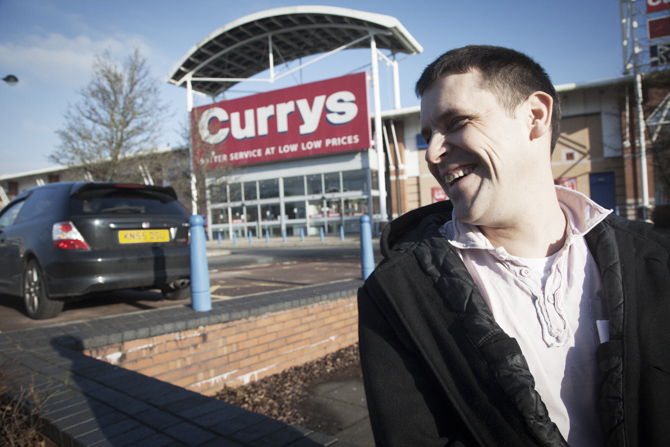
“When I was out of work I’d get into a routine: every morning I’d come down to the UCAN. It’d get me out of the house, stop me looking at the four walls or watching TV. If you want a job, you have to have the right mindset.
“But that operation took me out for a long time. My self-esteem took a big knock. When someone sits you down and says, ‘It’s going to be difficult for you Darren, you’re going to have to learn to walk again’, then your confidence goes.”
“But you did do it,” I say, “you did learn to walk again.”
“Yeah. Yeah. I’ve done it. I still struggle a bit but if someone saw me on the street I’d just look like anyone else.”
Once recovered Darren got work through an agency as a warehouse order picker which he did for two years. He was then on benefits for a fortnight before he got another job doing the same kind of work. Five months later he was laid off. That was more than two years ago and it was then that he first started to use the UCAN.
“It’s been a tough time. Really tough. I wouldn’t want to do it again but you don’t have a choice, do you? At first I came to the UCAN every other day, then every day. I was unsure, shy really, and they helped me. I told them I wasn’t great on the computer and they put me on the IT course.
“I only had a paper CV – nothing I could email – and they helped me make a proper CV. Now I’ve got different CVs for different jobs and they’re absolutely immaculate, you’re not going to beat them.”
When Darren wasn’t spending time on the Work Programme – a compulsory ‘job club’ for the long term unemployed – he was at the UCAN sending off CVs. “Me, personally, I would be applying for 10 jobs a day. That’s me. That’s my preference.”
“Why? What makes you so motivated?” Daft question.
“Because I want a job. I believe, in my head, if you are determined enough, there’s something out there for everyone.”
“Are there enough jobs for people who want them, do you think?
“It depends what sort of job you want,” he says. “I believe if you aim too high you’ll only be disappointed. You have to be realistic. Believe me, I don’t want national minimum wage but you have to go for it. Anything else is a bonus. You can work your way up.”
Darren has now a job on the help desk of some security company. He receives calls when building alarms are triggered and sends an engineer to investigate. With his first wages he wandered into Currys and bought himself a washing machine.
As we’re talking I imagine what sort of TV programme the documentary team might have made had they followed Darren for the last twelve months. It wouldn’t be very exciting, and certainly wouldn’t make prime time.
There’d be hours of footage of Darren in front of the computer looking for work; shots of him cooking his own fresh food – “I’d rather make something myself than get a takeaway” – and not a single scene of drunken excess because, as he says, “for me, paying the bills is more important than drinking”.
If Benefits Street isn’t typical then maybe super-motivated, healthy-eating Darren isn’t either but there must be plenty of people in between.
Yesterday, at his party’s conference, the chancellor George Osbourne announced plans for a Help to Work scheme for the long-term unemployed. This morning’s free paper has already dubbed it ‘Womble for welfare’ as it’d require claimants to pick up litter and clean graffiti.
I thought Cath – the employment advisor whose course I wrote about – would be dead against it. “If it helps build up self-esteem and motivation I’d be right behind it,” she says. “But, you know, they’ve had these ideas before and mostly it’s to please the voters, they are never planned out properly.
“I guarantee if we interview every single person who is unemployed there would be very few who say they love it. Very few. But the fear of losing their benefits is immense and so they’d rather stay where they are, it feels safer. When a new scheme sounds like a threat – like this does – then it’s not going to work.”
It’s employment day at the UCAN and the regular staff have some specialist support. As well as Cath, there’s Michael, locally-renowned for his CV expertise; Paula, a training provider, who plugs her BTEC courses and Nigel from the Careers Service who barely has space in one of the small offices to perch his laptop.
By mid morning Morag has arrived. She’s excited about having an application form to fill out. A friend told her about a cleaning job at the town’s theatre and she’s clutching the job spec and application form. She has until five tomorrow to return the completed form.

“The important part is this,” says Carl as he shows her the ‘essential criteria’ part of the job spec. “Here you might want to demonstrate how you’ve worked as part of a team. For example, while I was working for such and such a company, I worked as part of a team…”
“…can that be for a school as well? When we were doing displays we all used to work together.”
“Yeah, that’s great. Anything like that,” says Carl. “Clean to high standards, to be punctual and efficient, able to be flexible as regards working hours. So you need to think how you meet these. They are the skills you need to do this job, that’s basically what they are saying.”
There seems to be a change in Morag even since last week when we went to the Jobcentre together. Since then she’s been to a job fair; she’s getting help with an application and is coming back this afternoon to see Nigel, the careers advisor.
Within ten minutes of the work club session starting after lunch, all the computers are occupied. Notebook in hand, I look around the small room, trying to work out who’s doing what.
CV maestro Michael is helping a man complete his CV for a warehousing job. Next to him Paula is helping another. Rosanne is keeping tabs on who is next in the queue for either a CV or a consultation with Nigel.
The front door is opened again and again. Each time a head bobs in, takes a look at the frenetic activity and disappears. “I’ll be back later,” I hear one of the heads say.
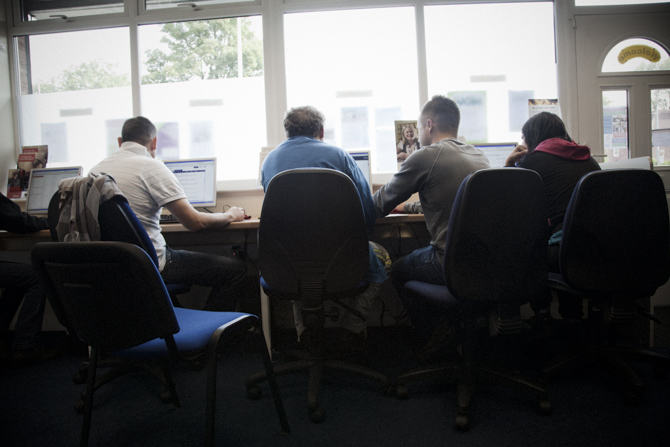
Carl is multi-tasking, trying to help three people at once. “Just give me five minutes,” he says to one, as he jumps to another, “I’ll be right with you.”
There are now 18 people in the room. It would make a good photograph but, when I suggest it, not everyone is keen. I make do with the back of some heads.
Morag has finished her consultation with Nigel. “How did that go?” I ask, as she heads for the door.
“Great,” she says, “he’s given me some good ideas.”
“You really seem to be enjoying looking for work,” I say.
“I am. I’m determined to get a job.”







